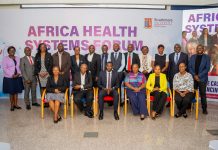By Samantha Linda
The fourth Annual Scientific Conference, convened by Daystar University in Nairobi, Kenya’s capital, brought together different climate stakeholders to discuss one big question: How do we protect both the planet and the people living on it?
Themed ‘Climate Change for Planetary Health’, the conference aimed to strengthen multidisciplinary research in advancing planetary health as a key component of climate action, driving meaningful discussions across various research dimensions.
The Chief Guest, Dr. Mazyanga Lucy Liwewe Mazaba, Regional Director for the Eastern Africa Regional Co-coordinating Centre of the Africa Centres for Disease Control and Prevention (Africa CDC), made it clear that climate change is not just an environmental issue but one that directly threatens human survival.
Dr. Mazaba emphasized that floods, droughts, heatwaves, and the spread of diseases are already showing how climate impacts public health.
“Climate change is not only an environmental concern; it is also a public health crisis,” she stated. “Unless we address planetary health now, future generations will face unmanageable risks.”
Underscoring the need to place health at the center of the climate change debate, she urged leaders to act with urgency before the crisis escalates beyond control.
Kenya’s Special Envoy for Climate Change, Ambassador Ali Daud Mohamed, highlighted the crisis’ policy implications. With the 30th United Nations Conference of the Parties on Climate Change (COP30) in Brazil quickly approaching, he emphasized that Kenya and other African countries must strike a balance between global commitments and local realities.
“Our policies should not only meet global expectations but also respond to the realities of our communities,” he said, advocating for laws that protect farmers, water sources, and livelihoods, to ensure that climate solutions are felt not only on paper but also in practice.
Ambassador Prof. Bitange Ndemo brought a futuristic yet practical perspective by showing how technology and innovation can provide answers to Africa’s climate challenges. He highlighted the transformative role of smart farming apps that predict weather and guide planting, renewable energy solutions that cut carbon emissions, and ICT innovations that enable better knowledge sharing and early warning systems.
Calling on African countries to embrace digital solutions and homegrown innovations to strengthen their resilience against climate shocks, he said: “ICT and innovation are powerful tools that can provide solutions in mitigation and adaptation.”
The three-day conference (13th-15th August) positioned Daystar University as a hub for climate dialogue in Africa, taking place just weeks before the Second Africa Climate Summit in Addis Ababa, Ethiopia and COP30 in Brazil. Its timing underscored the urgent need for African voices to influence global climate negotiations.
In the end, the conference was more than just an academic event. It was a call to action. It reminded everyone present that climate change is not a distant challenge; it is happening now, affecting health, food security, and livelihoods. While leaders and experts carry great responsibility, action must also begin with individuals, communities, and students.






